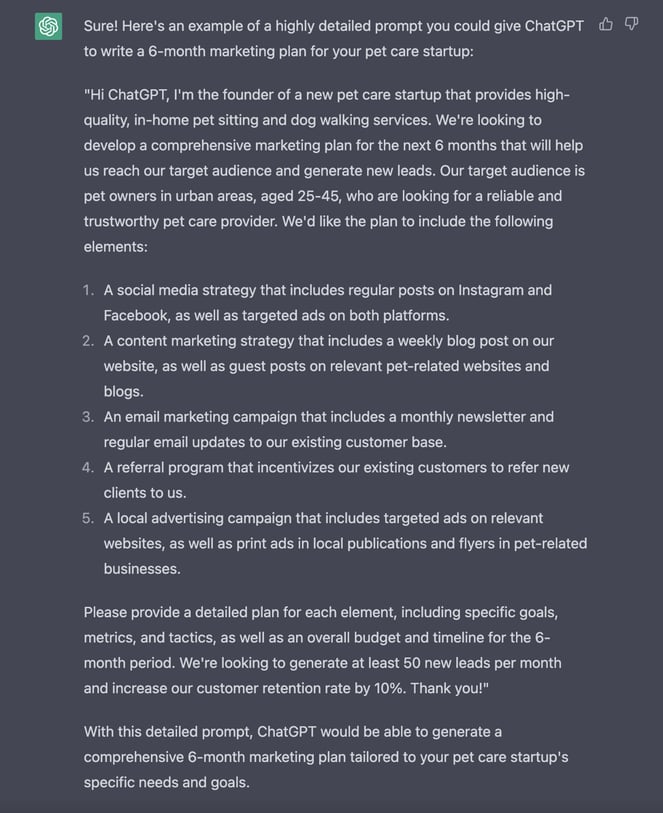It's one of the fastest technological shifts we've ever seen. AI tools are having their moment, and every day we see new developments in this amazing story.
Some marketers worry about their jobs being disrupted. Others are excited about the immensely creative possibilities it brings.
How do you feel about it?
As a marketer, you don't have the luxury of ignoring it for much longer. AI is already transforming the industry in big ways, and your competitors are figuring out how to use it to their advantage.
From the solo growth manager to the enterprise marketing department, everyone in marketing needs to realise where they stand. So here's an overview of how AI is changing the future of digital marketing, and how you can make use of it right now.
AI's main marketing benefit: driving creativity
If you've not already been amazed by the power of Artificial Intelligence tools, spend a few minutes with ChatGPT.
All you need to know about ChatGPT is that it’s a "large language model developed by OpenAI that can generate human-like text based on a given prompt or question." And it can generate some very impressive text.
You can ask it to write a poem about your company, a short story about an alien invasion in your local coffee shop, or a joke about your favorite animal. You could ask it to explain quantum physics in the style of a particular movie character.
But instead of using it like a surface-level search engine or gimmicky chatbot, dig in and see what you can make it do. Its power is really unleashed when you give it more detail and context to work with.
If you're wondering how AI helps in digital marketing, here's a great example. We asked ChatGPT:
"Give me an example of a highly detailed prompt I could give ChatGPT to write a 6-month marketing plan for my pet care startup."
This is what it returned:

So we pasted the entire text back into ChatGPT, and it gave us pretty much an entire marketing plan.
This whole process took about 2 minutes from the initial query.
We can easily query the details, asking it to clarify parts, format it into tables, and manipulate the info in lots of different ways.
The creative possibilities are endless.
As well as generating creative work, AI can also be used to analyze it and help you make decisions. Take the example of Nestlé, which recently used the CreativeX AI tool to unify and rank creative ads on different platforms to set standards for their 15,000 marketers. Engagement with creative is difficult to master, especially with a large organization and complex product line. But AI can be deployed at scale to help companies tackle complicated challenges like this easily.
The best way to see the true power of these tools is to try them for yourself.
AI tools for marketing
We're truly in a golden period for AI tools right now, with exciting new offerings coming out every single day.
As well as the more general AI chat-based services, marketers can enjoy using more specific tools. Here's some that you can get started with today.
Productivity and research
For researching articles, white papers, reports and so on, AI can help, but it can't do everything for you. Trusting tools like ChatGPT to give accurate data is really risky, because their underlying systems are based on guessing words and facts in a predictive way, rather than actually finding them.
That said, here's a few AI tools that can speed up your research process (just remember to fact-check what they say)
- Perplexity: A chat-based search engine that summarizes live results it finds online.
- New Bing: Microsoft's GPT-powered search engine with a conversational AI interface that understands complex, multi-step queries.
- Dimensions: Search academic research papers (filter 'open access' to read full papers)
Written content creation
You can generate all kinds of articles, marketing copy and communications in a matter of seconds with AI. ChatGPT is most people’s first experience of this, but there are other tools that can be better suited to marketers.
In its current iteration, the text that ChatGPT generates is safe, formulaic, and quite boring. There's no edge or personality to it, and it has a particular linguistic style that's probably not on-brand with your existing output. So for content marketing, you'll have to do some prompt engineering – the art of giving AI detailed instructions to get the exact result you want.
As well as this, ChatGPT (as well as all generative AI services) isn’t factually accurate. It makes a lot of mistakes, so you have to fact-check everything it says.
In the words of the tool itself,
"Remember, ChatGPT is a language model designed to generate human-like text based on the prompts it receives. While it can be fun to test its abilities with wacky or creative prompts, it's important to keep in mind that it may not always produce coherent or meaningful responses, particularly if the prompt is too far outside of its trained knowledge domain."
Getting it to write in your brand voice is challenging, which is why competitors like Jasper and Writer are launching enterprise-level tools that promise to use your own marketing collateral to train custom AI models.
But it's worth experimenting with AI content, because it can certainly save time and effort in certain use cases, like ecommerce copywriting or SEO. You could try:
- Longshot: blog posts with linked citations for facts
- ai: marketing copy using templates
Sales
The world of sales communication has been a great fit for AI, due to its short-form messaging style and formulaic, repetitive nature.
If you want to generate outreach campaigns at scale, you can benefit from tools such as:
- Lavender: AI sales email coach that helps you write persuasive emails
- ai: automatically generate presentations and slide decks
- Rev: customer prospecting and analytics, powered by AI
One thing to note is that sales tactics evolve as people get used to them. Many of these services promise 'personalization at scale', which creates the illusion that you've hand-crafted an email to someone. In time, recipients might lose trust in email marketing like this when they realize much of it is AI-generated, so your tactics may have to evolve.
Images and videos
Advances in generative AI have enabled tools that are seriously good at generating images from simple instructions. Will they be the exact images you have in mind? Probably not – at least until better user interfaces are developed.
Right now, AI image generation has limited use for marketing channels.
For feature images at the top of blog posts to illustrate a conceptual idea (like this one!), they can be great. But if you want to design a product or showcase something really specific, you'll have to get a designer to come up with something manually.
Try the tools for yourself:
- Stable diffusion: Type in a prompt, receive an image
- Photo AI: An 'AI photographer': generate alternate profile pics and headshots based on real photos
- BrandMark: AI logo generation and branding assets
The possibilities for video creation are rather exciting, too. Marketers might be interested in:
- Waymark: Automatically create video ads for your business
- Synthesia: AI-generated educational videos with synthetic avatars
Customer Support
New forms of automation can be used to optimize the customer experience, too. Machine learning algorithms can work their magic behind the scenes, interacting with your CRM, customer data stores and product inventory to create brand new ways for customers to interact.
For online retailers wanting to boost conversion rates and up their customer satisfaction scores, tools like these can be a big advantage.
Big data is also a crucial part of marketing; by using AI algorithms to scan large customer data sets, you can gain insights you never might have had before. You can understand customer behavior at scale, see what’s working in the user experience and what isn’t, and mix analytics with human intelligence to gain a deeper understanding of potential customers.
Some AI customer-focused tools that might benefit your digital marketing strategy:
- Brand24: track your brand mentions and gauge sentiment based on customer profiles
- Sprinklr: use conversational AI chatbots for real-time customer service
- Gupshup: implement conversational commerce on your e-shop
AI is a new skill marketers should learn
The wave of AI hype that appeared in late 2022 was driven by a single tool – ChatGPT.
But the underlying technology represents a fundamental technological shift in how we interact with computer systems. Like blockchain is to cryptocurrency, AI will power a whole new layer of tech activity. In this case, it’s creative computing.
In February 2023, Microsoft (which partly owns ChatGPT) opened beta access to the new Bing. This massively more powerful AI-enabled search engine is like ChatGPT, but able to search the internet and generate thoughts on live data. It could pave an entirely new path for the way we search for information online.
In fact, it wouldn't be a surprise to see many of the above tools available in Microsoft Office at some point soon, given their relationship with market leader OpenAI.
This means learning how to interact with AI to get your desired outputs is likely to be a key skill in the coming decades (check out our lesson library in the link to learn more). If it’s capable of generating infinite data, your curation skills might be more valuable than your creative ones.
This means that digital upskilling is your key to remaining competitive, whichever innovations AI may bring to the industry.
Will AI replace digital marketers?
So will marketing be replaced by AI? AI-powered tools will almost certainly replace some marketing functions.
But somebody still needs to tell the AI what to do. And if you wouldn't hand off important marketing strategy planning to an outsourced assistant, you wouldn't hand it to an AI instead.
As a marketer, it's better to think of AI tech as a really useful assistant for certain parts of your working life. It can certainly help make you more productive, insightful and creative.
Think of content writing, for example. It would have been fairly simple to ask ChatGPT to write this entire article. But it wouldn't have the human experience that you can connect and empathise with. It wouldn't know the same range of AI tools that we do. It doesn't have the behind-the-scenes experience of the digital marketing and L&D worlds as we do, either.
AI can easily write an article about AI marketing tools, but it can’t do it from a unique perspective.
Also – AI-produced work needs editing. You can't just trust AI to write 100% accurate, factually correct, on-brand material. One day, full AI marketing might be possible, but the risks are just too high right now.
There's an awful lot that educated, wise humans can still bring to the table. It's a time for optimism, not despair.
To learn more about AI and how it can be used by businesses to help achieve their objectives, check out our course on AI for Marketing here.





